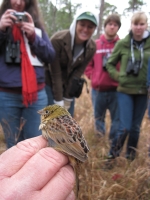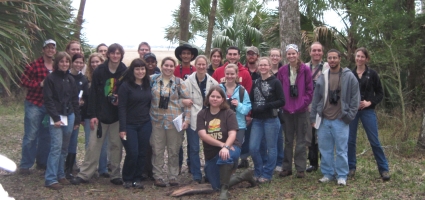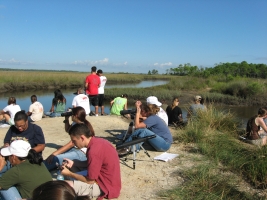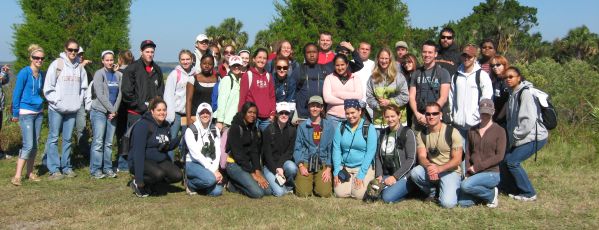Teaching
I believe it's crucial for students to connect classroom topics to the natural world around them. That's why every undergraduate course I teach includes substantial hands-on field experiences. These have ranged from worm grunting in the Apalachicola National Forest to surveying migrating birds during camping trips in Central Florida, tagging monarch butterflies at St. Mark's NWR, studying the prey capture decisions of green lynx spiders, and catching sparrows at Tall Timbers Research Station. At the core of all my instruction is the principle of critical thinking. Applying critical thinking to the observable natural world highlights the vital role that both logic and nature play in life beyond the classroom -- and it's fun!
At the core of all my instruction is the principle of critical thinking. Applying critical thinking to the observable natural world highlights the vital role that both logic and nature play in life beyond the classroom -- and it's fun!
Coming soon - Outreach resources: We love sharing our enthusiasm for birds with local communities, and have a set of outreach activities enjoyed by the primary-school children in Boca Chica, Panama. We aspire to provide some of those here, but if you need info before this section of the website is deployed, please reach out to Emily by email.
I regularly teach three upper-level undergraduate courses and one graduate-level reading group at FSU:
Animal Behavior (ZOO4513, 4 credits)
This course is an introduction to the biological study of animal behavior, including current questions, methods, and results. A major goal of the course is to develop students' ability to critically evaluate scientific data, and to explain it in writing to others. The course is designed for undergraduate and graduate students who want to better understand the evolution of, adaptive significance, and mechanisms of animal (including human) behavior. I expect that anyone taking this course will learn enough about animal behavior that they could attend a professional conference on the subject (e.g. the annual meeting of the Animal Behavior Society) and understand most of the presentations. Offer each fall semester.
Ornithology (ZOO4353C - a.k.a. Natural History of Higher Vertebrates, 4 credits)
Ornithology includes two lectures and one lab per week. The lecture component of this course offers a survey of the evolution, morphology, behavior and reproductive biology of birds (Class Aves). Labs include study of prepared museum specimens, dissections and field trips in the local area. Students in this course can expect to gain familiarity with physiological, morphological, and behavioral adaptations of bird species to specific ecological challenges, and understanding of current avian research techniques and results. They will also develop knowledge of characteristics that distinguish extant bird taxa, as demonstrated by the ability to identify any bird in the world to order, and any Florida bird to family. Finally, they will gain natural history knowledge and species-level identification skills for 198 Florida bird species, in the lab and when possible in the field (including vocalizations for some species). Typically offered every other fall semester.
Experimental Biology - Behavioral Ecology (BSC3402L, 3 credits)
Experimental Biology is designed to teach students about the process of biological research, emphasizing the acquisition of research and communication skills. In this section of Experimental Biology, we examine behavioral ecology. Through a combination of lectures, readings, and group discussions, students acquire background knowledge on the broad questions being asked in this discipline, and the approaches commonly used to address these questions in free-living animals. They acquire hands-on experience applying this knowledge through two group field projects. Students then design your study, analyze the results, and present findings orally and in written format to practice the skills needed to conduct their own research. Then, they synthesize what they have learned to design and carry out an independent research project. This includes writing a proposal, collecting and analyzing data, and presenting results in oral and written form. Projects typically explore the behavior of our diverse local invertebrates including green lynx spiders, ebony jewelwing damselflies, abundant pollinators, or ants.
Tropical Behavioral Ecology (with Experimental Biology)
This is an international field course conducted in the Republic of Panama, and taught in collaboration with Dr. Kevin Dixon. This program gives students both a broad overview of tropical biology in Panama and exposure to behavioral and ecological research in a tropical field setting. Students earn credit in Tropical Behavioral Ecology and Experimental Biology. Tropical behavioral ecology focuses on topics directly relevant to the tropics, including plant-insect interactions, frugivory in birds, and responses of plants and animals to anthropogenic disturbance. Students explore these topics during guided hikes, field lectures, and readings. We will also explore at length the processes underlying the extraordinary biotic diversity of the tropics. Experimental Biology includes group research projects on topics chosen by students in consultation with instructors, as well as an in-depth individual project of the student's design. Student work will include research proposals, oral presentations, and scientific reports. Field experiences will occur in seasonally dry forest, tropical wet forest, and montane tropical forest at three locations in Panama.
Offered through the International Programs office of FSU.
Integrative Reviews in Animal Behavior ("Behavior Lunch") BSC 5932-42
This is an interdepartmental reading and discussion group for graduate students and faculty. The goal of this group is to facilitate research discussions between diverse faculty and graduate students who might not otherwise interact. To promote a diversity of viewpoints, co-sponsorship of this group rotates among faculty from the Neurobiology and Ecology & Evolution divisions of the Department of Biological Science and from the Psychology Department. Participants lead round-table discussions of primary literature or present research seminars. Join us, and bring a bag lunch! Watch for emails regarding organizational meetings at the beginning of each semester. We meet in room 4077 KIN. Follow the link above for a look at the previous semesters' discussion schedule.
-----------------------------------------------------------------------------
Blast from the past: some favorite memories from classes taught over the years


